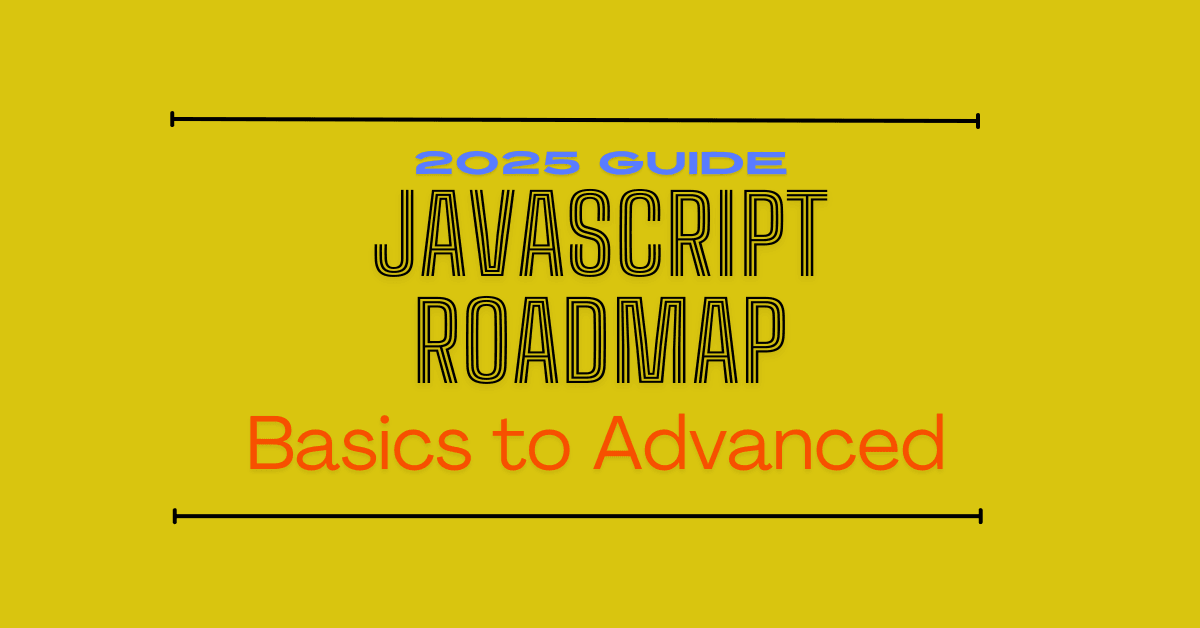Best-ever comprehensive JavaScript roadmap that includes all types of functions and key mechanisms, starting from the basics to the most advanced concepts. This roadmap will guide you through everything, making you proficient in JavaScript.
1. JavaScript Basics
Setting Up
- Install a Text Editor (VS Code, Sublime)
- Install Node.js for environment setup
- Browser DevTools setup
Core Concepts
- Variables and Data Types
var,let,const- Primitive Data Types:
string,number,boolean,null,undefined,symbol - Non-primitive: Arrays, Objects, Functions
- Operators
- Arithmetic (
+,-,*,/,%) - Assignment (
=,+=,-=) - Comparison (
==,===,!=,!==) - Logical (
&&,||,!) - Ternary Operator (
condition ? trueValue : falseValue)
- Arithmetic (
2. Functions
Basic Functions
- Function Declaration vs Function Expression
- Arrow Functions (ES6)
const add = (a, b) => a + b; - Function Parameters and Arguments
- Default parameters
- Rest parameter (
...args) - Spread operator
- First-Class Functions
- Functions as values
- Functions as arguments and return values
Advanced Function Mechanisms
- Higher-Order Functions
- Functions that accept other functions as arguments or return functions
function higherOrder(fn) { return fn(); } - Closures
- Functions that “remember” their lexical scope
- function outer() { let counter = 0; return function inner() { counter++; return counter; }; }
- Immediately Invoked Function Expressions (IIFE)
(function() { console.log('IIFE executed!'); })(); - Recursion
- Functions calling themselvesfunction factorial(n) { return n === 0 ? 1 : n * factorial(n – 1); }
- Currying
- Breaking a function with multiple arguments into a series of functions that each take a single argument
- function curryAdd(a) { return function(b) { return a + b; }; }
- Function Composition
- Combining multiple functions to produce a new function
- const compose = (f, g) => (x) => f(g(x));
3. Asynchronous JavaScript
Callbacks
- Introduction to the callback mechanism
function doSomething(callback) { callback(); }
Promises (ES6)
- Chaining Promises (
then,catch,finally)const promise = new Promise((resolve, reject) => { resolve('Success'); });
Async/Await (ES8)
- Handling asynchronous operations with cleaner syntax
async function fetchData() { const response = await fetch(url); const data = await response.json(); }
4. JavaScript Object-Oriented Programming (OOP)
Object Creation
- Object literals
const person = { name: 'John', age: 30 };
Constructor Functions
- Creating objects using constructor functions
function Person(name, age) { this.name = name; this.age = age; }
ES6 Classes
- Class syntax
class Car { constructor(brand) { this.brand = brand; } } - Inheritance with
extendsandsuperclass ElectricCar extends Car { constructor(brand, battery) { super(brand); this.battery = battery; } }
5. JavaScript Mechanisms
Lexical Scope
- How JavaScript determines variable scope
- Global, function, and block scope
Hoisting
- Hoisting behavior of variables and functions
Closures
- Inner functions having access to the outer function’s scope
The Event Loop
- Understanding JavaScript’s non-blocking, single-threaded execution model
Call Stack
- JavaScript’s function execution context mechanism
Execution Context
- Global and Function execution contexts
Prototypal Inheritance
- Objects inheriting properties from their prototype
function Animal(name) { this.name = name; } Animal.prototype.speak = function() { console.log(`${this.name} makes a sound`); };
This Keyword
- Dynamic context and behavior of
this
Event Bubbling and Capturing
- Event flow in the DOM
6. Advanced Concepts
Modules
- ES6 Modules:
import/export// module.js export const greet = () => console.log("Hello!"); // main.js import { greet } from './module.js'; greet();
Error Handling
try,catch,finally, andthrowtry { throw new Error('Something went wrong!'); } catch (error) { console.log(error.message); }
Design Patterns
- Module Pattern
- Singleton Pattern
- Factory Pattern
- Observer Pattern
- MVC (Model-View-Controller)
7. Asynchronous JavaScript Advanced
AJAX & Fetch API
- Using Fetch API for making HTTP requests
fetch(url) .then(response => response.json()) .then(data => console.log(data));
WebSockets
- Real-time communication using WebSockets
const socket = new WebSocket('ws://localhost:8080'); socket.onmessage = (event) => console.log(event.data);
8. JavaScript Performance
Memory Management
- Memory leaks and garbage collection
JavaScript Engines
- How JavaScript engines (like V8) work
Event Loop Optimization
- Microtasks and macrotasks
Debouncing and Throttling
- Optimizing function calls during frequent events (like scrolling, resizing)
9. Testing & Deployment
Unit Testing
- Using tools like Jest, Mocha, and Chai
test('adds 1 + 2 to equal 3', () => { expect(1 + 2).toBe(3); });
CI/CD Integration
- Automated testing with CI/CD tools (Jenkins, TravisCI, GitHub Actions)
10. JavaScript Ecosystem
Frameworks and Libraries
- React.js and Vue.js for frontend
- Node.js and Express.js for backend
- Redux and Vuex for state management
TypeScript
- Strong typing with TypeScript for larger applications
Bundling Tools
- Webpack, Babel, and Parcel for managing dependencies and building code
This roadmap ensures that you cover all functions, mechanisms, and concepts in JavaScript, progressing from beginner to advanced topics!
